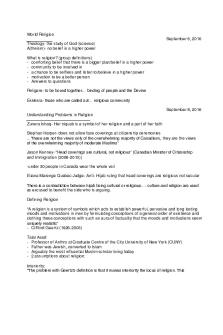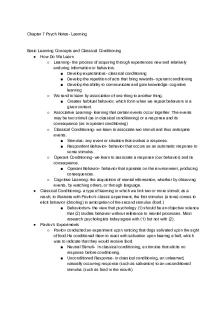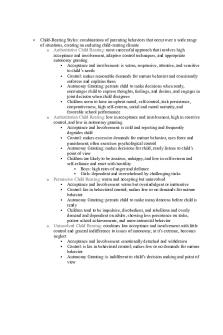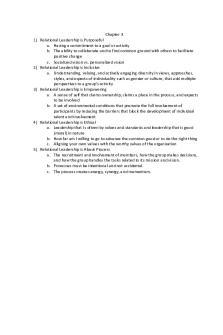Chapter 8 - Summary Exploring Psychology PDF

| Title | Chapter 8 - Summary Exploring Psychology |
|---|---|
| Author | Kendal Corrado |
| Course | Intro to Psychology 111 |
| Institution | Binghamton University |
| Pages | 5 |
| File Size | 57.8 KB |
| File Type | |
| Total Downloads | 48 |
| Total Views | 162 |
Summary
Notes...
Description
Studying and Encoding Memories ● Studying Memory ■ Memory- the persistence of learning over time through the encoding, storage, and retrieval of information ○ Measuring Retention ■ Recall- a measure of memory in which the person must retrieve information learned earlier, as on a fill-in-the blank test. ● When asked to recall peoples names from highschool, people would not be able to. But when given faces, they can match names to them. ■ Recognitions- a measure of memory in which the person identifies items previously learned as on a ;multiple-choice test. ● Quick function of memory, ■ Relearning- a measure of memory that assesses the amount of time saved when learning material again. ○ Memory Models ■ Help us to understand how the brain forms and retrieves memories. ■ To remember an event ● Get information into our brain, a process called encoding ○ Encoding- the process of getting information into the memory system--- for example. By extracting ‘meaning. ● Retain that information, a process called storage ○ Storage- the process of retaining encoded inforamtion over time ● Later get the information back out, a process called retrieval. ○ Retrieval- the process of getting information out of memory storage. ● Parallel Processing- processing many aspects of a problem simultaneously; the brain’s natural mode of information processing for many functions. ○ We first record to-be-remembered information as a fleeting sensory emmory ■ Sensory Memory- the immediate, very brief recording of sensory information in the memory system. ○ From there, we process information into short-term memory, where we encode it through rehearsal. ■ SHort Term Memory- activated memory that holds a few items briefly, such as digits of a
○
●
phone number while calling, before the information is stored or forgotten. Finally, information move into long-term memory for later retrieval ■ Long-term memory- the relatively permanent and limitless storehouse of the memory system. Includes knowledge, skills,and experiences.
○ Encoding Memories ○ Dual - Track Memory: Effortful Versus Automatic Processing ■ Explicit Memory- the retention of facts and experiences that one can consciously know and “declare.” ■ Effortless Processing- encoding that requires attention and conscious effort. ■ Automatic Processing- unconscious encoding of incidental information, such as space, time, and frequency, and of well-learned information, such as word meanings. ■ Implicit Memory- retention of learned skills or classically conditioned associations independent of conscious recollection. ○ Automatic Processing and Implicit Memories ■ Procedural Memory- automatic skills and classically conditioned associations among stimuli. ● Space ● Time ● Frequency ○ Effortful Processing and Explicit Memories ● Automatic processing happens effortlessly. ■ Sensory Memory- feeds our active working memory, recording momentarily images of scenes or echoes of sounds. ● Iconic memory- a momentary sensory memory of visual stimuli; a photographic or picture-image memory lasting no more than a few tenths of a second. ● Echoic memory- a momentary sensory memory of auditory stimuli; if attention is elsewhere, sounds and words can still be recalled within 3 or 4 seconds. ■ Short-Term Memory Capacity ● We can store about 7 pieces of memory in short term memory ● SHort term memories often fade when the brain begins other tasks. ● We do our best work when focusing on one task at a time; we are not meant to multitask.
■
Effortful Processing Strategies ● Chunking- organizing items into familiar manageable units; often occurs automatically. ● Mnemonics- memory aids, especially those techniques that use vivid imagery and organizational devices. ● Testing Effect- enhanced memory after retrieving, rather than simply rereading, information. Alsoc sometimes referred to as a retrieval practice effect ir test-enhanced learning. ■ Levels of Processing ● Shallow processing- encoding ona basic level, based on the structure or appearance of words. ● Deep Processing- encoding semantically, based on meaning of other words; tends to yield the best retention. Storing and Retrieving Memories ● Memory Storage ○ Retaining Information in the Brain- memory is not limited to one portion of the brain ■ Explicit Memory System: The Frontal Lobes and Hippocampus ● Semantic- explicit memory of facts and general knowledge; one of our two conscious memory systems ● Episodic- explicit memory of personally experienced events; one of our two conscious memory systems ● Hippocampus- a neural center located in the limbic system; helps process explicit (conscious) memories--- of facts and events--- for storage. Damage to the hippocampus affects memory.Temporarily holds memories before they are seperated. ○ Left-hippocampus damage- people have trouble with verbal information, but they have no trouble recalling visual designs and locations. ○ Right-hippocampus damage- the problem is reversed. ● Memory consolidation- the neural storage of long term memory ○ Sleep promotes memory consolidating ■ Implicit Memory System: The Cerebellum and Basal Ganglia ● Cerebellum- forms and stores implicit memories created by classical conditioning. ○ Damaged Cerebellum- people cannot form conditioned reflexes. ● BAsal Ganglia- a deep brain structure involved in motor movement, facilitates the formation of our procedural memories for skills ○ Riding a bike.
●
Infantile Amnesia- the inability of people to recall and remember their first four years of life. ○ Lack of language ○ Underdeveloped hippocampus ■ The Amygdala, Emotions, and Memory ● Our emotions trigger the release of hormones which influence the formation of memories. ● AMygdala- a feature of the limbic system with emotion-processing clusters which indicates which memories are important. ○ Synaptic Changes- locations where neurons meet and communicate with one another via neurotransmitters. ■ Serotonin- triggered when learning occurs ■ Long-term potentiation- an increase in a cell’s firing potential after brief, rapid stimulations; a neural basis for learning and memory. ● Drugs that block LTP interfere with learning ● Memory Retrieval ○ Retrieval Cues- pieces of perceived memory that act as associative portions of a memory. ● Smells, tastes, and sights ■ Priming- the activation, often unconsciously, of particular associations in memory. ● Invisible memory, without your conscious awareness. ■ Context-Dependent Memory ● Putting yourself back in the context where you experienced something can prime your memory retrieval ○ Going back to your childhood home. ● Encoding Specificity Principle- the idea that cues and contexts specific to a particular memory will be most effective in helping us recall it. ■ State-Dependent Memory ● What we learn in one state may be more easily recalled when we are again in that state. ● Mood Congruent Memory- the tendency to recall experiences that are consistent with one’s current good or bad mood. ○ Mood influences your perception of situations ■ Serial Position Effect- our tendency to recall best the last and first items in a list Forgetting, Memory Construction, and Improving Memory ● Forgetting-sometimes we forget things to make room for other, more important information. ○ Forgetting and the Two Track Mind ■ Anterograde amnesia- the inability to form new memories ● H.M
■
●
●
Retrograde amnesia- inability to retrieve information from one’s past. ● Dory ○ Encoding Failure ■ Age can affect encoding efficiency… the parts of the brain responsible for this are less responsive with age. ○ Storage Decay ■ The course of forgetting is initially rapid, then levels off with time ○ Retrieval Failure ■ Tip-of-the-tongue phenomena ○ Interference- although the brain can never be full, it can be cluttered. ■ Proactive Interference- the forward-acting disruptive effect of older learning on the recall of new information. ■ Retroactive Interference- the backward-acting disruptive effects of never learning on the recall of old information. ○ Motivated Forgetting ■ Repression- in psychoanalytic theory, the basic defense mechanism that banishes from consciousness anxiety-arousing thoughts, feelings, and memories ● We repress painful or unacceptable memories to protect our self-concept and to minimize anxiety. Memory Constructing Errors ■ Reconsolidation- a process in which previously stored memories, when retrieved, are potentially altered before being stored again. ○ Misinformation and Imagination Effects ■ Misinformation Effect: occurs when misleading information has corrupted one’s memory of an event. ● Visualizing something and imagining it acitivate similar portions of the brain. ○ Source Amnesia ■ Faulty memory for how, when, or where information was learned or imagined ○ Discerning True and False Memories ○ Children’s Eyewitness Recall Improving Memory...
Similar Free PDFs

Social psychology chapter 8
- 6 Pages

Psychology Chapter 8 homework
- 3 Pages

Psychology Chapter 8 Notes
- 6 Pages

Exploring World Religions Summary
- 19 Pages
Popular Institutions
- Tinajero National High School - Annex
- Politeknik Caltex Riau
- Yokohama City University
- SGT University
- University of Al-Qadisiyah
- Divine Word College of Vigan
- Techniek College Rotterdam
- Universidade de Santiago
- Universiti Teknologi MARA Cawangan Johor Kampus Pasir Gudang
- Poltekkes Kemenkes Yogyakarta
- Baguio City National High School
- Colegio san marcos
- preparatoria uno
- Centro de Bachillerato Tecnológico Industrial y de Servicios No. 107
- Dalian Maritime University
- Quang Trung Secondary School
- Colegio Tecnológico en Informática
- Corporación Regional de Educación Superior
- Grupo CEDVA
- Dar Al Uloom University
- Centro de Estudios Preuniversitarios de la Universidad Nacional de Ingeniería
- 上智大学
- Aakash International School, Nuna Majara
- San Felipe Neri Catholic School
- Kang Chiao International School - New Taipei City
- Misamis Occidental National High School
- Institución Educativa Escuela Normal Juan Ladrilleros
- Kolehiyo ng Pantukan
- Batanes State College
- Instituto Continental
- Sekolah Menengah Kejuruan Kesehatan Kaltara (Tarakan)
- Colegio de La Inmaculada Concepcion - Cebu











